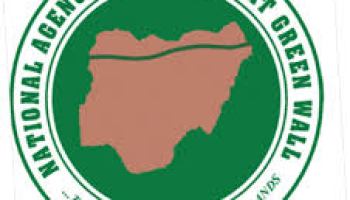By Rosemary Ogbonnaya
National Agency for Great Green Wall, NAGGW has reiterated its desire and commitment to improve the livelihood of over 20 million Nigerians by the year 2030.
The Agency said it targets to rehabilitate degraded land by establishing 13,000km of shelterbelt, 250,000Ha of woodlots, and 250,000Ha of community orchards, so as to boost agricultural production and improve the livelihoods of about 20million people by 2030.
Disclosing this at the workshop training on opportunity mapping for improved decision-making and monitoring of the agency’s activity organised by United Nations Environment Program, UNEP, in collaboration with NAGGW, the Minister of Environment, Barrister Mohd H. Abdullahi said the objective Great Green Wall programmes is highly ambitious as it aims to restore and sustainably manage land in the Sahel-Saharan region to address both land degradation and poverty.
Speaking at the workshop, the Minister said, “As we all are well aware, the world is in the midst of simultaneously addressing multiple _ risks: the Climate Emergency and Related Water Risks, Both at Times Too Much Water and Too Little Water; Food Security; Biodiversity Loss; Pollution and the list goes on. Nonetheless, amid the gloomy forecasts, there are some positive takeaways and the Government of Nigeria is taking positive steps to mitigate these risks as much as possible within the resources available.”
According to him,the government of Nigeria has a well-established collaboration with the United Nations Environment Programme, starting with the Ogoniland programme in 2009 and more recently on the HYPREP project for environmental remediation in Rivers State.
Abdullahi also said in line with the relevant provisions of the GGW Convention, a National Strategic Action Plan was developed to serve as framework for the implementation of the program in 2012 and is currently undergoing a review.
Explaining further, the Minister said for Nigeria to meet the target of improving livelihood by 2030, NAGGW has already engaged baseline studies and Environmental Impact Assessments; community mobilisation, sensitisation and awareness campaign; afforestation and land management; promotion of alternative livelihoods; rural infrastructure; and employment generation.
He also listed the ongoing program to include: Ecological restoration and rehabilitation to enhance the livelihoods of the affected communities and strengthen their resilient to climate change, promotion of climate smart agricultural practices to enhance food security and climate change adaptation; improvement of critical rural infrastructure for enhanced socioeconomic development; and promotion of alternative and efficient sources of rural energy to reduce deforestation and combat climate change.
The programme, according to hm, focuses on 11 states most affected by desertification: Adamawa, Bauchi, Borno, Gombe, Jigawa, Katsina, Kano, Kebbi, Sokoto, Yobe and Zamfara. These states constitute about 35% of the country’s total land area.
“The workshop of today marks the kick-off of the third capacity-building workshop organized by UNEP with NAGGW with the focus on enhancing the technical capacities of the NAGGW to establish a model for improved data collection, monitoring and ultimately better decision making in assessing priorities for programme activities. It has introduced international best practices on ecosystem-based disaster risk reduction and adaptation to enhance programme implementation of the Nigerian Great Green Wall with a focus on restoring and rehabilitating degraded ecosystems.
Also, the Director General, NAGGW, Dr. Yusuf Maina- Bukar said GGW programme is a Pan-African Initiative adopted by the African Union in 2007 as a strategy to address land degradation and desertification in the Sahel and Sahara regions of Africa.
Maina- Bukar said GGW programme interventions are to boost food production and support communities to adapt to climate change variation and variability.
The Director General said his aspiration is to curtail the menace of desertification and land degradation by combating them in order to protect and restore ecosystem and provide essential ecosystem services for poverty reduction, enhancing food security and promotion of sustainable livelihoods.
NAGGW, according to him, has restored degraded lands by establishing 389.46km Shelterbelt, 264.7 ha of woodlots, 250.5ha of community orchard and trained about 500 farmers on farm natural regeneration projects and other activities that impacted the lives of affected communities.
The eleven frontline states on Nigeria are Adamawa, Bauchi,Borno,Gombe,Kano,Katsina,Kebbi,Jigawa, Sokoto, Yobe and Zamfara.




